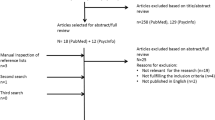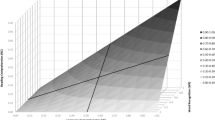Abstract
To assess memory problems associated with attention deficit disorder with hyperactivity (ADDH) and reading disability (RD), nonverbal subspan, span, and supraspan measures was administered to 30 ADDH, 30 normal, and 24 RD boys, ages 7 to 12. Results from the supraspan verbal measures, which included word lists and related and unrelated paired associates, are reported. Across all verbal tasks, deficits became most apparent in ADDH boys on measures requiring organized, deliberate rehearsal strategies, sustained strategic effort, and careful consideration of response alternatives. This pattern suggests impaired self-regulatory or “executive” processes. RDs showed more generalized deficits across the verbal measures, suggesting problems with verbal processing. Recent studies supporting this interpretation are reviewed.
Similar content being viewed by others
References
Ackerman, P. T., Anhalt, J. M., & Dykman, R. (1986). Inferential word-decoding weakness in disabled children.Learning Disability Quarterly, 9, 315–324.
Ackerman, P. T., Anhalt, J. M., Holcomb, P. J., & Dykman, R. (1986). Presumably innate and acquired automatic processes in children with attention and/or reading disorders.Journal of Child Psychology and Psychiatry, 27, 513–529.
August, C. J. (1987). Production deficiencies in free recall: A comparison of hyperactive, learningdisabled, and normal children.Journal of Abnormal Child Psychology, 15, 429–440.
Benezra, E., & Douglas, V. I. (1988). Short-term serial recall in ADD-H, normal, and reading disabled boys on non-verbal memory tasks.Journal of Abnormal Child Psychology, 16, 511–525.
Borcherding, B., Thompson, K., Kruesi, M., Bartko, J., Rapoport, J. L., & Weingartner, H. (1988). Automatic and effortful processing in attention deficit/hyperactivity disorder.Journal of Abnormal Child Psychology, 56, 333–345.
Boucugnani, L. L., & Jones, R. W. (1989). Behaviors analogous to frontal lobe dysfunction in children with attention deficit hyperactivity disorder.Archives of Clinical Neuropsychology, 4, 161–173.
Bradley, L., & Bryant, P. E. (1978). Difficulties in auditory organization as a possible cause of reading backwardness.Nature 221, 746–747.
Brady, S., Mann, V., & Schmidt, R. (1987). Errors in short-term memory for good and poor readers.Memory and Cognition 15, 444–453.
Brown, A. L. (1975). The development of memory: Knowing, knowing about knowing and knowing how to know. In H. W. Reese (Ed.),Advances in child development and behavior, 10 (pp. 103–152). New York: Academic Press.
Ceci, S. J. (1982). Extracting meaning from stimuli: Automatic and purposive processing of the language based on learning disabled.Topics in Learning and Learning Disabilities, 2, 46–53.
Chelune, G. J., Fergunson, W., Koon, R., & Dickey, T. O. (1986). Frontal lobe disinhibition in attention deficit disorder.Child Psychiatry and Human Development, 16, 221–234.
Conners, C. K. (1972). Symposium: Behavior modification by drugs: Psychological effects of stimulant drugs in children with minimal brain dysfunction.Pediatrics, 49, 702–708.
Craik, F. I., & Lockhart, R. S. (1972). Levels of processing: A framework of memory research.Journal of Verbal Learning and Verbal Behavior, 11, 671–684.
Douglas, V. I. (1983). Attentional and cognitive problems. In M. Rutter (Ed.),Developmental neuropsychiatry (pp. 280–328). New York: Guilford Press.
Douglas, V. I. (1988). Cognitive deficits in children with attention deficit disorder with hyperactivity. In Bloomingdale, L. M. & Swanson, G. (Eds.),Journal of Child Psychology and Psychiatry, Book supplement to the journal number 5, 65–81.
Douglas, V. I., & Peters, K. G. (1979). Toward a clearer definition of the attentional deficit of hyperactive children. In G. A. Hale & M. Lewis (Eds.),Attention and the development of cognitive skills (pp. 173–247). New York: Plenum Press.
Dunn, L. M. (1959).Peabody Picture Vocabulary Test. Minneapolis: American Guidance Service.
Durrell, D. D. (1955).Durrell analysis of reading difficulty. New York: Harcourt, Brace and World.
Felton, R. H., Wood, F. B., Brown, I. S., & Campbell, S. K. (1987). Separate verbal memory and naming deficits in attention deficit disorder and reading disability.Brain and Language, 31, 171–184.
Ghent, L., Mishkin, M., & Teuber, H. L. (1962). Short-term memory after frontal lobe injury in man.Journal of Comparative and Physiological Psychology, 55, 705–709.
Gorenstein, E. E., Mammato, C. A., & Sandy, J. M. (1989). Performance of inattentive-overactive children measures of prefrontal-type function.Journal of Clinical Psychology, 45, 617–632.
Griswold, P. C., Gelzheiser, L. M., & Shepherd, M. J. (1987). Does a production deficiency hypothesis account for vocabulary learning among adolescents with learning disabilities.Journal of Learning Disabilities, 20, 621–626.
Hamlett, K. W., Pellegrini, D. S., & Conners, C. K. (1987). An investigation of executive processes in the problem-solving of attention deficit disorder hyperactive children.Journal of Pediatric Psychology, 12, 229–239.
Hasher, L. & Zacks, R. T. (1979). Automatic and effortful processes in memory.Journal of Experimental Psychology: General, 108, 356–388.
Incisa della Rochetta, A. (1986). Classification and recall of pictures after unilateral frontal or temporal lobectomy.Cortex, 22, 189–211.
Kahneman, D., & Triesman, A. (1984). Changing views of attention and automaticity. In R. Parasuraman & D. Davies (Eds.),Varieties of attention (pp. 29–61). New York: Academic Press.
Katz, R. B., Shankweiler, D., & Liberman, I. (1981). Memory for item order and phonetic recoding in the beginning reader.Journal of Experimental Child Psychology, 32, 474–484.
Kinsbourne, M. (1977). The mechanism of hyperactivity. In M. Blau, I. Rapin, & M. Kinsbourne (Eds.),Topics in child neurology (pp. 289–306). New York: Spectrum Press.
Lambert, N. M., & Sandoval, J. (1980). The prevalence of learning disabilities in a sample of children considered hyperactive.Journal of Abnormal Child Psychology, 8, 33–50.
Lewkowicz, H. K. (1980). Phonemic awareness training. What to teach and how to teach it.Journal of Educational Psychology, 72, 686–700.
Levine, M. D., Busch, B., & Aufsuser, C. (1982). The dimension of inattention among children with school problems.Pediatrics, 70, 387–395.
Luria, A. R. (1966).Higher cortical functions in man. New York: Basic Books.
Mann, V. A. (1986). Why some children encounter reading problems. The contribution of difficulties with language processing and phonological sophistication to early reading disability. In J. K. Torgensen} & B. Y. L. Wong (Eds.),Psychological and educational perspectives on learning disabilities (pp. 133–160). Orlando, FL: Academic Press.
Mark, L. S., Shankweiler, D., Liberman, I. Y., & Fowler, C. A. (1977). Phonetic recording and reading difficulty in beginning readers.Memory and Cognition, 5, 623–629.
McGee, R., Williams, S., Moffitt, T., & Anderson, J. (1989). A comparison of 13-year-old boys with attention deficit disorder and/or reading disorder on neuropsychological measures.Journal of Abnormal Child Psychology, 17, 37–53.
Milner, B., & Petrides, M. (1984). Behavioral effects of frontal lobe lesions in man.Trends in Neurosciences, 7, 403–407.
Olson, R. K., Davidson, B. J., Kliegl, R., & Davies, S. E. (1984). Development of phonetic memory in disabled and normal readers.Journal of Experimental Child Psychology, 37, 187–206.
O'Neill, M. E., & Douglas, V. I. (in press, a). Rehearsal strategies and story recal performance in attention deficit disorder and normal boys.Journal of Pediatric Psychology.
O'Neill, M. E., & Douglas, V. I. (in press, b). Study strategies and story recall in attention deficit disorder, reading disabled and normal boys.Journal of Abnormal Psychology.
Ornstein, P. A., & Naus, M. J. (1978). Rehearsal processes in children's memory. In P. A. Ornstein (Ed.),Memory development in children (pp. 69–99). Hillsdale, NJ: Erlbaum.
Ornstein, P. A., & Naus, M. J. (1985). Effects of the knowledge base on children's memory strategies. In H. W. Reese (Ed.),Advances in Child Development and Behavior, 19 (pp. xx-xx). New York: Academic Press.
Osterrieth, P. A. (1944). Le test de copie d'une figure complexe.Archives de Psychologie, 30, 206–356.
Paris, S. G., & Lindauer, B. K. (1977). Constructive aspects of children's comprehension and memory. In R. V. Kail & J. W. Hagen (Eds.),Perspectives on the development of memory and cognition (pp. 35–39). Hillsdale, NJ: Erlbaum.
Passler, M. A., Isaac, W., & Hynd, G. W. (1985). Neuropsychological development of behavior attributed to frontal lobe functioning in children.Developmental Neuropsychology, 1, 349–370.
Shankweiler, D., Liberman, I. Y., Mark, L. S., Fowler, C. A., & Fischer, F. W. (1979). The speed code and learning how to read.Journal of Experimental Psychology: Human Learning and Memóry, 5, 531–545.
Share, D. L., & Schwartz, S. (1988). A note on the distinction between attention deficit disorder and reading disability: Are there group-specific cognitive deficits?Brain and Language, 34, 350–352.
Shiffrin, R. M., & Schneider, W. (1977). Controlled and automatic human information processing: II. Perceptual learning automatic attending, and a general theory.Psychological Review, 84, 127–190.
Shue, K. L. (1989).Attentional deficit hyperactivity disorder and the frontal lobe syndrome. Unpublished doctoral dissertation, McGill University, Montreal.
Shue, K. L., & Douglas, V. I. (1989). Attention deficit hyperactivity disorder, normal development and the frontal lobe syndrome.Canadian Psychology, 30, 498 (Abstract).
Siegel, L. S., & Ryan, E. B. (1989). The development of working memory in normally achieving and subtypes of learning disabled children.Child Development, 60, 973–980.
Stanovich, K. E. (1988). The right and wrong places to look for the cognitive locus of reading disabilities.Annals of Dyslexia, 38, 154–177.
Stuss, D. T., & Benson, D. F. (1984). Neuropsychological studies of the frontal lobes.Psychological Bulletin.95, 3–28.
Swanson, H. L. (1983). Relations among metamemory, rehearsal activity and word recall of learning disabled and non-disabled readers.British Journal of Educational Psychology, 53, 186–194.
Tant, J. L., & Douglas, V. I. (1982). Problem-solving in hyperactive, normal, and reading disabled boys.Journal of Abnormal Child Psychology, 10, 285–306.
Thorndike, E. L., & Lorge, I. (1944).The teachers world book of 30,000 words. New York: Teachers College. Columbia University, Bureau of Publications.
Torgensen, J. (1988). Studies of children with learning disabilities who perform poorly on memory span tasks.Journal of Learning Disabilities, 21, 605–612.
Torgensen, J. K., & Licht, B. (1983). The learning disabled child as an inactive learner; Retrospect and prospects. In J. D. McKinney & L. Feagans (Eds.),Topics in learning disabilities, 1 (pp. xx-xx). Rockville, MD: Aspen Press.
Vellutino, F. R., Steger, J. A., Harding, C. J., & Phillips, F. (1975). Verbal vs. non-verbal paired associates learning in poor and normal readers.Neuropsychologia 13, 75–82.
Weingartner, H., Rapoport, J. L., Buschsbaum, M. S., Bunney, W., Mikkelson, E. J., & Caine, E. D. (1980). Cognitive processes in normal and hyperactive children and their response to amphetamine treatment.Journal of Abnormal Psychology, 89, 25–37.
Author information
Authors and Affiliations
Additional information
This research was partially supported by Grant MA-6913 from the Medical Research Council of Canada. We are grateful for the help of Rhonda Amsel in the various stages of this project.
Rights and permissions
About this article
Cite this article
Douglas, V.I., Benezra, E. Supraspan verbal memory in attention deficit disorder with hyperactivity normal and reading-disabled boys. J Abnorm Child Psychol 18, 617–638 (1990). https://doi.org/10.1007/BF01342751
Revised:
Issue Date:
DOI: https://doi.org/10.1007/BF01342751




